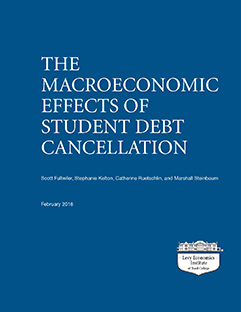
Research Topics
Publications on Education
-
The Macroeconomic Effects of Student Debt Cancellation
Research Project Report, February 2018 | February 2018 Among the more ambitious policies that have been proposed to address the problem of escalating student loan debt are various forms of debt cancellation. In this report, Scott Fullwiler, Research Associate Stephanie Kelton, Catherine Ruetschlin, and Marshall Steinbaum examine the likely macroeconomic impacts of a one-time, federally funded cancellation of all outstanding student debt.
Among the more ambitious policies that have been proposed to address the problem of escalating student loan debt are various forms of debt cancellation. In this report, Scott Fullwiler, Research Associate Stephanie Kelton, Catherine Ruetschlin, and Marshall Steinbaum examine the likely macroeconomic impacts of a one-time, federally funded cancellation of all outstanding student debt.
The report analyzes households’ mounting reliance on debt to finance higher education, including the distributive implications of student debt and debt cancellation; describes the financial mechanics required to carry out the cancellation of debt held by the Department of Education (which makes up the vast majority of student loans outstanding) as well as privately owned student debt; and uses two macroeconometric models to provide a plausible range for the likely impacts of student debt cancellation on key economic variables over a 10-year horizon.
The authors find that cancellation would have a meaningful stimulus effect, characterized by greater economic activity as measured by GDP and employment, with only moderate effects on the federal budget deficit, interest rates, and inflation (while state budgets improve). These results suggest that policies like student debt cancellation can be a viable part of a needed reorientation of US higher education policy.
Download:Associated Programs:Author(s): -
An Empirical Analysis of Gender Bias in Education Spending in Paraguay
Working Paper No. 550 | November 2008Gender affects household spending in two areas that have been widely studied in the literature. One strand documents that greater female bargaining power within households results in a variety of shifts in household production and consumption. An important source of intrahousehold bargaining power is ownership of assets, especially land. Another strand examines gender bias in spending on children. This paper addresses both strands simultaneously. In it, differences in spending on education are examined empirically, at both the household and the individual level. Results are mixed, though the balance of evidence weighs toward pro-male bias in spending on education at the household level. Results also indicate that the relationship between asset ownership and female bargaining power within the household is contingent on the type of asset.
Download:Associated Program:Author(s):
